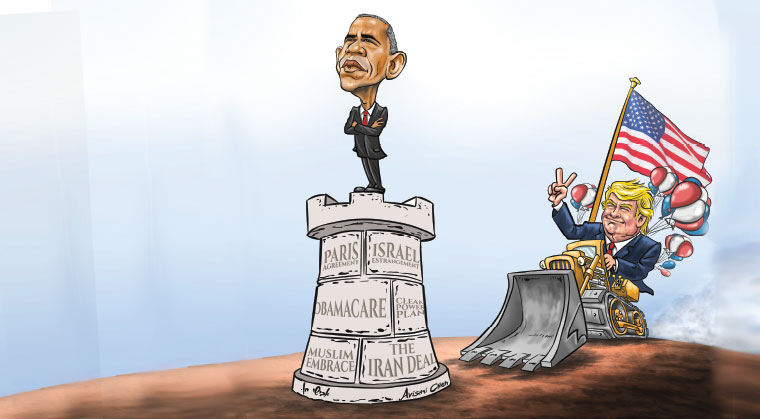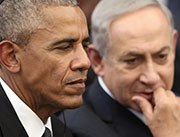
NEW REGIME Donald Trump has promised — with the help of G-d and some luck — to upend Obama’s feats with Republicans fast-tracking a replacement for Obamacare and a foreign-policy team sending warm messages to Israel instead of Obama’s cold shoulder. But whether he gets the help he asked for and needs remains to be seen. Can Trump really undo the last eight years? (Illustration: Avishai Chen Photos: AFP/Imagebank Flash90)
T oday Obama is an avid golfer in his own right but 1961 was the first year that a man of Obama’s color could have teed off with a Donald Trump: that was the year in which the Professional Golfers Association revoked its “Caucasian-only clause” opening the door for all players to participate in professional golf tournaments.
When Obama was born Congress was still three years away from ratifying the Civil Rights Act. Segregation was still in vogue. Restaurants in a dozen southern states still barred men of color from getting a seat at the table while gas stations posted signs on their restrooms reading “white men only.”
No discussion about Barack Obama’s legacy can begin without expressing the significance of his breaking the White House’s color barrier in 2008 — an achievement guaranteed to cement his legacy. Obama wistfully alluded to his breakthrough in last week’s farewell address in Chicago. “After my election there was talk of a post-racial America” Obama began. “Such a vision however well intended was never realistic. Race remains a potent and often divisive force in our society.”
That one line of Obama’s oratory also summarizes his legacy: long on well-intended vision and short on results.
To be fair Obama’s record is sprinkled with success stories especially in the first half of his first term when a Democratic Congressional majority provided a tailwind. Obama stabilized an economy that collapsed under the weight of a trillion dollars in bad loans and speculative real estate mortgages and investments. During his eight years in office unemployment fell from 8.3% to 4.7%. Economic output grew from $14 trillion to almost $18 trillion. Economists who label this a measly recovery from a recession fail to consider that this was the worst American recession since the Great Depression.
If “Made in the USA” is to be the mantra of the incoming Trump administration then Obama deserves credit for following through with the widely criticized too-big-to-fail bailout of General Motors. Since then GM sales have soared 70% and the rustbelt company is close to reclaiming its position as the world’s largest automaker. And even Donald Trump should be proud that a record flow of the gasoline that powers American automobiles is now produced in the US.
Yet the bulk of Obama’s grandiose plans proved to be failures.
Obama’s vision for universal healthcare was built on a rickety foundation of mistaken assumptions about consumer choice and the government’s ability to influence medical costs. His notion that Middle East peace was attainable by appeasing radicals merely emboldened and empowered those same extremists hastening the fragmentation of the Arab world and undermining Israel’s security. And if anyone could have healed old racial wounds it was Obama. Instead of pounding the table with the message of his own success he subtly fed the same divisive narrative he professed to oppose identifying with street criminals instead of backing the law enforcement community.
Donald Trump takes office with grandiose plans of his own the first of which is to upend the Obama legacy — and fast — as Trump might say. Congressional Republicans are fast-tracking a replacement for Obamacare. Trump’s foreign policy team has sent strong signals to traditional US allies specifically Israel to expect a warm public embrace in place of Obama’s cold shoulder.
In his first and only news conference as president-elect Trump promised — with the help of G-d and some luck — to be the biggest job creator in White House history.
If Obama won small and lost big the Trump presidency offers America the opposite promise.
Whether he gets the help he asked for and needs remains to be seen. In the pages that follow we review Obama’s legacy on six key issues how Trump plans to undo it and the chief obstacles he will face on his road to success or failure.
RESET ON ISRAEL / THE OBAMA LEGACY
As seasoned Middle East diplomat Dennis Ross wrote in his book about the US-Israel relationship Doomed to Succeed every US president performs a juggling act when it comes to Israel. Is Israel a partner or a problem? Obama entered office inheriting the post-9/11 Bush legacy — a war on terror. Obama said Arabs’ perception of this as a war on Islam was detrimental to US interests. Obama settled on a nuanced course where the US continued military aid and strategic cooperation with Israel while distancing itself from Israel regionally.

Obama leaves office on the heels of a public spat with Netanyahu who has for the moment outlasted his chief adversary in office
Because of personal and policy conflicts Obama also made a public show of distancing himself from Israel’s prime minister. Obama signaled those differences with Israel at the outset visiting Cairo five months into his first term while skipping Jerusalem; boosting the regional aspirations of leaders such as the Muslim Brotherhood’s Mohamed Morsi in Egypt; calling Recep Tayyip Erdogan in Turkey one of his closest friends; and showing Netanyahu the sole of his shoe in a famous White House photo. Obama leaves office on the heels of a public spat with Netanyahu who has for the moment outlasted his chief adversary in office.
The Trump Doctrine
The only resemblance that Donald Trump’s Middle East team bears to Obama’s are their job titles. In his confirmation hearings Secretary of State-designate Rex Tillerson indicated the Trump administration would restore Israel’s status as America’s number one Middle East ally. Trump’s choice for national security advisor Michael Flynn has said that “Islam is a political ideology. It definitely hides behind this notion of being a religion.”Three of Trump’s top advisors on Israel are Orthodox Jews who have expressed strong support for Israel’s claim to Judea and Samaria. Combined with Trump’s stated support for moving the US Embassy to Jerusalem it’s no wonder the Netanyahu government can’t wait to roll up its sleeves and get down to business with Trump.
Prospects and Pitfalls
Donald Trump respects Binyamin Netanyahu because he’s cut from the same cloth — he is brash and a strong leader. The Donald and Bibi are destined to have a great first meeting when they get together in Washington. They will discuss the entire gamut of issues of joint interest to the two countries and hammer out a working plan. The major question is: What happens when two very headstrong men butt heads? It’s inevitable at some point that Trump will ask Bibi to do something he can’t. Since the US provides Israel with $3.8 billion a year in military aid and not the other way around the US has the upper hand. Will Bibi cave? Or will he fight as he got used to doing with Bush and Obama? And if he bares his teeth to Trump how will Trump react to a too-tough Bibi?


